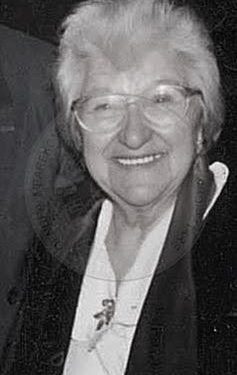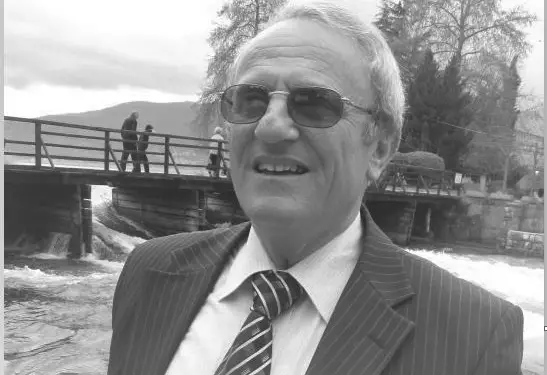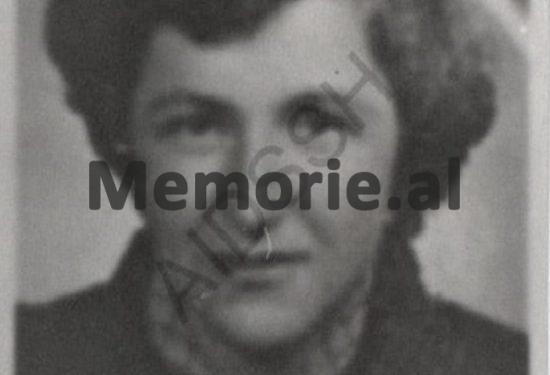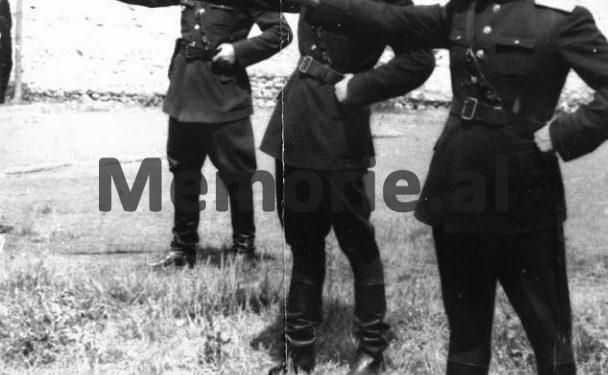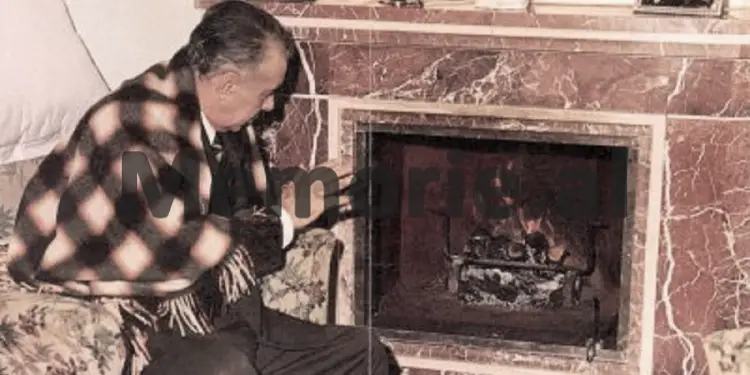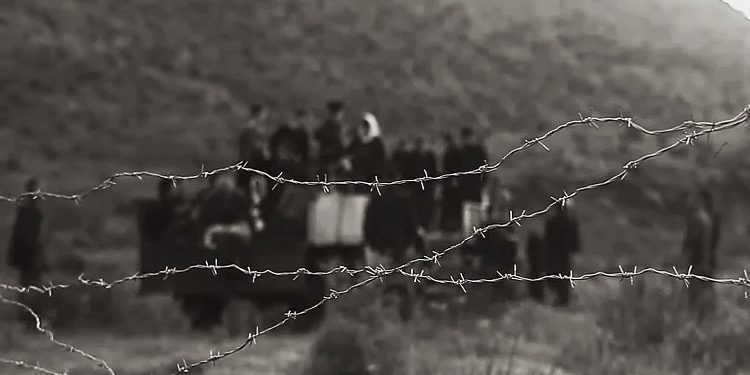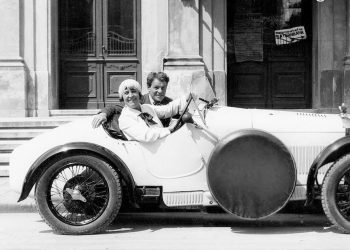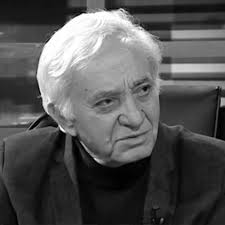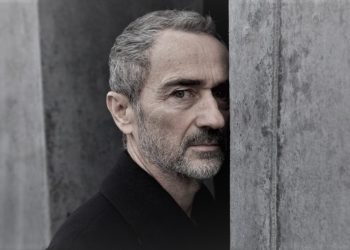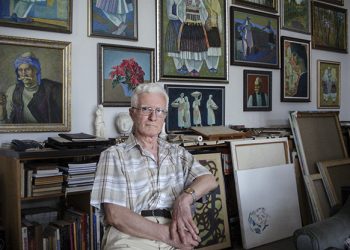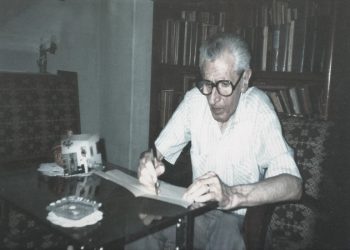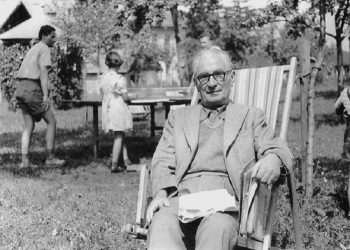From Shpendi Topollaj
The third part
Memorie.al / When the symbols of communism, after half a century of struggle, collapsed, there was such a loud noise that we woke up from our deep sleep. We opened our eyes, but not all of us believed what had happened: often, as a person sees some dreams that he takes for truth, he also sees some truths that he takes for dreams. Moreover, there were not a few who opposed this historic upheaval, with demonstrations and even threats. To overcome this situation, patience and wisdom were needed. We were brothers. As such, we had an intellectual, moral and spiritual duty to denounce the demagoguery of communism and the monstrous crimes of the red inquisition. Of course, the most reliable were those who had languished and suffered in prisons and exiles. Silence would really be a great sin of theirs…!
Continues from last issue
THE REBEL SINGER
– The poetic creativity of Dhora Leka –
One of the cruelest sins of the communist dictatorship, is undoubtedly the anathema of the artist. Without worrying at all, about the damage she does to her own nation, she, with her redeemed hand, mercilessly hits all those who, with their words and deeds, can make ordinary people even a little aware of the necessity of freedom. Alongside infinity of such examples, the case of the rebellious singer, Dhora Leka, remains typical. Dhora was born in 1922, in the cultured city of Korça. She grew up and was educated in the bosom of a family with outstanding patriotic traditions.
With the beginning of the Anti-Fascist Movement, Dhora, a young girl, became a partisan and in the mountains, although she did not know the art of composition at all, she became the author of most of the wonderful songs of the National Liberation War, songs that carried weight with their magic he was inspired by thousands and thousands of fighters and for which, the great Russian critic, Shvjetnikov, who compared Dhora’s songs with Karamanjolla and Varshanyanka, said that; “Even if he had been killed in the fire of war, these songs would be enough to make him immortal.”
And to think that such songs, which preserve their extraordinary values even today, like; “Constraint”, “Youth, youth”, “On those tops, belts – belts”, “From boyish breasts”, “Hymn of the army”, “Hymn of the martyrs”, “Revenge”, “The old man and the young man”, etc. , have been set to music with the only instrument, the whistle, there is no way not to be surprised by the talent and will of their author. Dhora’s songs, with their enthusiasm and unmatched harmony, are easy to learn and not easily forgotten. The famous Ilia Ehremburg once wrote: “It was the greatest pleasure to meet Dhora Leka, this girl from the mountains, who with her songs lifted the weight of a nation and which, in terms of importance, has incalculable values.”
Afterwards, Dhora Leka studies and graduates at one of the most prominent conservatories in the world, “Tchaikovsky” in Moscow.
There, alongside the talented violinist, Mark Kuvovčki, the composer A. Pahmudova, Andrej Eshpaj and Rudion Shchedrin, her friends and friends from Albania, Tonin Harapi, Tish Daija, Pjetër Gaci, Česk Zadeja, etc., were studying and making up the constellation of the colossi of our music. However, he did not say that Dhora would delve into her creative activity. The red inquisitors declared heretic that suffering Clio, who with the sweetness of her face, with a sincere and innocent look and a smile full of goodness, let you understand that you had in front of you a soul, so sensitive and delicate, so and relentless and optimistic.
As it is in the honor of a true intellectual and an artist with a free spirit, Dhora, seeing that the communist leadership was not at all coherent, between what it promised and what it did, therefore, since it was breaking away from the daily troubles of the people, leaving him completely destitute, takes the side of the latter and strongly raises the voice of protest, without fearing the dictator’s revenge. She dares to measure up to the “King”, so for study, she had the dark and cold cell, and for inspiration, loneliness, contempt but also faith in the future. And it was not a little, but a full 35 years of imprisonment and exile, as they were in Albania.
Proud of her fate and her pain, Dhora, who with her fiery songs, had not managed to win the sympathy of Enver Hoxha’s heart of stone (even though Orpheus, looking for Eurydice, with his songs, had longed for Hades, the god of the death of the infernal and had tamed the terrible dog Cerberus), as if to prove that saying of Pol Elyari, in the “Poetry of Circumstances”, that; “Injustice gives fire to justice”. He introduced poetry and stigmatizes that police regime, from whose whip, the blood of true patriots and democrats dripped. The Credo of Dhora is simple and meaningful:
“I became a singer in a storm,
Rebel singer all my life, I remained”!
It’s strange how it happens in life: often the life of an individual is similar to that of an entire country. The drama of Dhora coincides fourfold with that of the whole people. Moreover, although in most of Dhora Leka’s poems, there are two characters; me and you, again everyone abstracts, that something big is being talked about there. Thus, the poet never left the material that our reality served her, she did not fly on the wings of an art outside of Albanian time and space, but clinging to it, she always remained loyal to the land and the people of her country. In 1969, she wrote:
“Neither I nor you,
We are not handing over the weapons.
Not you!
That you are the first of tyranny,
Neither do I – no!
That I am a soldier, loyal from childhood”.
In this perspective, with the poems she wrote, Dhora Leka proved the dissidence that has existed in Albania, even to her credit, because she was the first to realize that the evil of this country blessed by nature, but cursed by fate, came from the autocratic and megalomaniac policy of Enver Hoxha, before whose exploits, those of Nero and his friends, look like toy toys. Far from the Parnassus of the poets who weaved dithyrambs, like a “piccolo – flauto”, that defiantly tunes out, in opposition to the tecano movements of the conductor’s bagette, who failed to complete a high school, she being realistic, about the state of her spiritual (that prison and exile were neither rest camps nor touristic places, but real Gulaks):
“Sometimes, boredom grips me,
Loneliness crushes me, cripples me.
He frowns, rubs his hands,
Stupidity eavesdrops.
Screams as the sky shakes:
“Boredom, you hear?
You can never beat me
Stupid boredom.
You don’t understand
What strength he has,
Who fights for freedom”!
We find these motifs in Dhora’s poetry very early, in the isolation of 1956, in “The canary was locked in the cage”, where even though she was ordered to be silent, she does not stop singing, which gives us the right, let’s call it Dhora Leken; “the bird that sang to freedom from the cage” although perhaps, she is more accurate when she compares herself to an oak tree:
“The downpour goes crazy,
The river flows:
– It will grow from the roots,
Vents and threatens…,
Lisit – Ante,
The power is not lost!
In a totalitarian state like ours, where arbitrariness reigned, a man could be punished, every time he shot at the black employees of the Security. And after mock trials or public unmaskings were organized, Dhora resumed the new punishment. Under these conditions, she worries more about her creativity than about herself. Maybe because she is used to it, maybe because she feels that she is completely innocent, she waits for the punishments, with exemplary coolness. She gets extremely upset, only when her mother, out of fear, burns her poems, not knowing that:
“The news of the burning,
Heavier than lead,
You pierced my breast”.
Then, the invincible Dhora. set:
“I tire the memory,
Now night and day,
That the “rebellious verses”
To bring them back to the light”!
And he starts writing again, in complete secrecy; “Silent Cloth”, “Invincible”, “Buy Colored Balloons”, “Macbeth”, “The Bell”, “Silent Elegy”, etc., which have since conception, the authenticity and civic courage. Isolated from the world, with a bitter sarcastic smile, the poet waits for October 16, the dictator’s birthday, and opposing the cacophony of hosannas for him, as she emphasizes that; he dethroned God, to mount himself on the pedestal, as the new God, he addresses Enver almost mockingly:
“You give us life,
Prosperity, happiness”
May the day be a thousand?
For you, we all become victims”.
And it does not take long to reveal the desire of the people, who silently curse the dictator, for all the “good” he has done, leaving him miserable and without any basic human rights. Nostalgia for the friends of pure ideals, who fought and were disappointed, torments the poet. She begins a poem dedicated to them, with the shocking question:
“Where are
What did the first guards do?!
And after showing that they tarnished them with all kinds of epithets, up to “traitors and enemies”, he expresses the belief that history will not forget them, and the people will honor them. And right after that, as if to create a strong contrast, she puts the poem “Laughing palace”, which ends with the cry: “How long will we endure?”
The sharp eye of the poet does not escape the spots in the photographs, which little by little, are covering so many faces of fighters that they are leaving the self-styled legendary commander alone, nor the photo montages, a shameful game of cutting and shifting heads, as it happened in life and according to the conjuncture created by the sick fantasy of the falsifier of our history. The poet has an almost pathological hatred for Enver Hoxha, so she never stops writing about him. In the poem “Eclipse”, after remembering the propaganda of the kissers, she trumpets that:
“The sun does not shine in Albania,
It doesn’t change the moon,
Enver Hoxha,
He has taken your place”!
She reasons that; therefore we have been living in the dark for 40 years.
Dhora Leka, this amazon, this warrior of war, who after leaving the rifle with which she had fought the Nazi-fascist invaders and after picking up the pen and waging a new war without compromise (she was never seduced and never broken by the headlines that they offered you), surprisingly, has a tender and loving heart, a noble heart for people. Here’s what the poet herself says: “I spent many years internment there, and when the toads left school, they sang; ‘On those peaks, belts – belts’, but some also threw stones at me, saying: ‘My old woman, exiled old woman’. Today I want to send a greeting to those reeds, from Sheq-Marinas.
Those in their village will never have exiles and I will go one day, gather those children around me and tell them: “I am Mother Dhora, I have come to you”. And I will kiss them all, like those who sang my songs, like those who threw stones at me. I will kiss and hug everyone. Today I hug and kiss the whole of Albania. All Albanians, wherever they are. We Albanians call our country Homeland, but we also call it motherland (mother’s land), and we all know that a mother loves her children, be they good or bad”.
The poet, who has suffered all her life, was full of vitality and laughter. “I have kept vitality and humor as the most expensive things, because they are the weapons of optimists and optimists are that dough of people, spiritually powerful and democratic”, she said in an interview and continued: “Why I loved humor and optimism? Without them, without full intellectual qualities, we could not withstand the monstrous dictatorship, imprisonments, exiles, insults, insults, deprivations, etc. without them, a person cannot remain young and virtuoso”.
And although when she was 70 years old and had personal problems, she never complained, but said: “I have enough work waiting for me”. The whole life and work of Dhora Leka brings to mind the myth of Prometheus, when he addresses Hermes: “I don’t want to change, rest assured, my miserable fate, with your slavery as a servant, because I prefer I am chained to this rock, rather than be the obedient lackey of Zeus.” We, her contemporaries, were able to boast of people and artists like Dhora Leka, who fearlessly opposed the dictatorship and manifested the freedom-loving and democratic spirit of our people.
But as Pascal says: “Without suffering, there are no laurels, without thorns, there is no crown, without wounds, there is no glory.” Naturally, the question arises: “Where did this fragile woman like her find the strength to challenge the dictatorship”?! And the answer is given by Plutarch, who, speaking of Cornelia, the mother of the Graca brothers, said of the skeptics: “…They… did not understand what energy gives a person, a good nature, and a healthy upbringing, for to subdue the pain, because, in the event that, in bravery, fortune prevails over virtue, in misery, he cannot take away from this man, the courage to face the evils”. Memorie.al
The next issue follows




